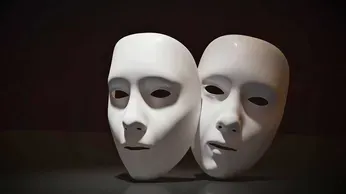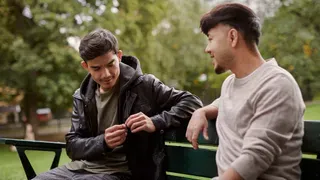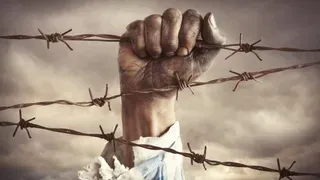
October 21, 2024
Peripheral Visions: Tryouts
Kilian Melloy READ TIME: 21 MIN.
"Peripheral Visions: You sense them from the corner of your eye or in the soft blur of darkest shadows. But you won't see them coming... until it's too late."
Tryouts
It was a Thursday when Owen lit his car on fire and walked away from the burning chassis with a few bare necessities in his rucksack. The fact that the car was also his home made the gesture complete and irreversible.
He was done with his old life. He was done with his job at the agriplex where he'd worked for eight years as a hand pollinator. He'd seen the shape of the future in the way the yields diminished despite everything they tried. Losing the world's bees had made new pollination techniques imperative, but the artificial approaches simply weren't working.
At least Leader Gregory, Kentucky's warlord, had enough vision to think about things like the food supply. Owen thought about that as he walked along the dusty road with his calloused bare feet. Most other localities – Georgia, Virginia, what was left of Florida – had simply descended into endless fighting over scraps.
But if killing each other for dwindling leftovers was self-defeating, working to revive the future was looking more futile all the time. Owen figured that technology was like every other human invention – it worked fine to a certain point, but then went haywire. Well, they had found their way to the haywire phase. Make what you want of your life now, or forget it, Owen thought, his resolve to leave not unwavering.
Owen came to an intersection. He paused to think about where each of the possible directions would take him. He scanned his surroundings, looking for any dust clouds or other evidence of approaching militias. He scanned the sky, too, looking for drones – not that he was likely to spot them if there were any in the area.
If anyone caught him – militia, security, bandits, anyone – rape was the most probable outcome. But Owen had endured rape before. And yes, he ran a very real risk of getting killed, but what did life mean when it was nothing but fear and distress and lies? If he lived, he would be free; if he died, at least he'd die as himself and not in the disguise he'd been forced to wear since early childhood.
Owen had weighed the risks and chosen this course of action. He'd traded for trousers and a man's shirt – the shirt had cost him his last pair of sandals – and he'd left the few articles of clothing from his old wardrobe in the car to burn, along with the rest of his former life – his insincere and fake life. The life he had lived under the name Rebecca.
Well, he wasn't Rebecca anymore. He hadn't ever really been Rebecca. He'd known since he was three years old that his body didn't match his inner self. His mother had forced him to wear dresses, and his stepfather had beaten and sexually punished him for any show of defiance, so Owen had hidden away under the pretense of Rebecca. But that was all over now. The car was burned, and so was any bridge back to the way things used to be. He had to go forward – so, now, which way would it be? Left, right, or straight on?
Straight would take him out of Leader Gregory's domain. Owen didn't know much about what life was like there. Maybe he should take his chances and find out. After all, rumors were always circulating that Blue States still existed, most of them up North, or to the East, on the coast. Places where there were no warlords, and the people ruled themselves.
Some workers expressed a cautious, qualified desire to live in the Blue States, but most workers denounced those far-away places as a pipe dream and a Utopia, saying that they didn't really exist. And if Blue States did exist – the majority of workers declared – then it was under socialism, which was a huge moral evil. At least life under a warlord was free of sin. If you simply did what the warlord told you, God would hold the warlord – not you – accountable for any wrongdoing. Those who obeyed on Earth would find repose in Heaven.
Owen looked off to his right. Far in the distance, black smoke billowed into the sky. It seemed a bad omen. Left would take him to the city – Gregory's city, where the warlord's mansion was. There'd be security men for sure, and they were often cruel – more so to people like Owen.
The sun climbed toward the top of the sky, and still Owen lingered. Then, from the direction of the black smoke, he saw a small group walking along the road. Like him, they all carried backpacks that looked to be mostly empty.
Not militia, then. Militia rode in little trucks, half a dozen men or more jammed into the beds and wielding rifles. And they weren't security – Leader Gregory's men were smartly turned out with uniforms. These were commoners like himself, working people, shod with sandals or walking barefoot.
At the head of the group was a beautiful, exotic-looking woman. She locked eyes with Owen as the group drew closer. He stared, entranced. She was smiling at him. He wondered if that meant she was interested in him in return, or if she smiled at everyone that way.
"Day," she said, as she came up close, the others shuffling along behind her.
"Day," he said.
"Are you heading to Leader Gregory's palace?" she asked him.
Owen laughed. He knew leader Gregory had a mansion, but – a palace?
"Are you going to the tryouts?" the woman asked.
"I don't quite know where I'm going," he answered.
She seemed disappointed. "So. You're not going to be able to guide us there."
"To Leader Gregory's mansion? Why do you want to go there? Aren't you worried what the security men might do?"
"No." She held out a scrap of paper. "This is our pass. Leader Gregory sent for us."
"What did you do?" Owen asked, alarmed.
Now it was the woman's turn to laugh. "Nothing. We're a theater troupe."
Owen didn't really know what that was.
"You know, theater? We put on plays."
"Plays?"
"We act out stories. Shakespeare? Orton? McCullers? Durang? All that sort of thing."
Nothing she was saying even sounded like English to Owen. But he was curious. If they had a pass – if Leader Gregory was offering them some sort of employment – then maybe this was a starting point for his own new life.
"You need a guide to find Leader Gregory's mansion? I can take you there," he said.
"What do you want for it?" she asked.
"Well..."
"Not money, because we don't have any," she said.
"No," Owen said. "What would I do with money? If you just let me travel with you, that's what I want."
"We can do that," she said. "The pass is for eight people, but Marshall turned back. He didn't want to leave his consort. They have a kid now."
"Uh huh," Owen said.
The woman and her group had stopped to talk. Now she started forward again, and the rest followed. Owen fell into step beside her.
"So, you've never acted, have you?" she asked.
"Well, actually... my entire life," Owen said. "It's all been one long performance."
She threw him a smile. It was lovely. He quivered inside.
"Then you'll fit right in. Unless you lose us this gig. In that case, we'll have to kill you."
Owen wondered if she really meant that.
"My name is Laura," she said.
"My name is Owen," he told her.
*** *** ***
It was twelve kilometers to the city. Owen and Laura talked the entire time. They were the only ones; no one else said a word. Owen made mental notes about his traveling companions. Now that he'd filled in as the eighth person in their party, there were four men and four women. Laura was the only one who smiled. The others all seemed weary and withdrawn. Owen wondered how such taciturn people could possibly be entertaining.
As they approached the city they began to see security men. They passed two checkpoints, and Laura produced the pass each time. The security men waved them on. They were remarkably similar to Laura's companions in their lack of warmth or energy. Owen had always thought of the security men as sadistic. He'd seen them a few times picking on people, acting superior and malicious. Maybe those were exceptions, because the men at the checkpoints just seemed bored. But then they encountered a security detail on patrol, and they were much like the ones Owen had seen before; they were hunters, entertained by prey. They made a few rude comments, but Laura's smile never wavered. Once they saw the pass they lost interest and piled back into their open-top car.
"So you smile at everyone that way," Owen teased Laura, as the security detail receded in a cloud of dust.
She grabbed his hand and gave it a squeeze. "Smiles are like money," she said. "You mostly give them out to get what you need, but sometimes they are a gift and they mean something more." She turned a most radiant, lovely expression on him, and he almost forgot to breathe.
*** *** ***
The mansion was smaller than Owen thought it would be – it was certainly no palace. For one thing, it wasn't made of smooth white stone, the way Owen imagined a palace would be. But there was a nice, well-tended lawn, and the mansion itself, though made of wood, had two stories.
Security men prowled around the grounds with machine guns in their hands, fingers resting on the triggers. They glared at the troupe, but no one made any rude comments.
Leader Gregory himself appeared, four women walking behind him. They were all lovely, but none of them, Owen thought, matched Laura.
Leader Gregory stared at Laura just the way Owen had. Then he glanced at the rest of the troupe. "Show me what you got," he said.
Laura did most of the showing. She sang, she did acrobatics, and she danced to the accompaniment of musical instruments the others produced from their backpacks and played with expertise. Owen stood in their midst as unobtrusively as he could.
After about half an hour, Leader Gregory clapped his hands and kept on clapping. Owen had seen something like this before, a long time ago. It was a way of showing approval, unlike a single clap, which usually meant to get busy or pay attention.
Laura bowed to Leader Gregory's applause.
"Very nice," Leader Gregory said. "You know what I want you to do, right? You will travel around my lands and bring enjoyment to my people."
"We understand," Laura said. "We will perform in your name, and the people will love you for it."
"In the meantime, as arrangements are made, you will work with my laborers," Leader Gregory said. "You will build, demolish, haul, cultivate, and do anything else the overseers assign you."
"We will," Laura said. "Only, we require adequate rehearsal time."
"When we have finalized plans, you will have plenty of time to rehearse," Leader Gregory said. He stood up, and his gaze lingered on Laura for a moment more. "It's indecent for a man to have more than four wives," he said, "or else I would take you into my home. But who knows? Maybe you can please me in other ways. Stay beautiful."
"I serve at your pleasure," Laura said, with a graceful movement that seemed part bow, part dance gesture.
Owen bit his lip and felt his eyes narrowing. Leader Gregory didn't notice it, which was lucky.
Once Leader Gregory was gone, one of the troupe began to complain. He was a man with a lean face, his cheek bones sharp and prominent, deep creases framing his mouth and giving him a look of disapproval.
"So, we're to be manual laborers just as we were back home," the man said. "This isn't the step up we wanted."
"Not yet," Laura told him. "But it will be. Just that we have a place to live is a step up."
"And will he feed us?" the man asked.
"Of course he will," Laura said, sounding impatient – something Owen realized he'd not seen before now. Even exasperated, she was gracious and beguiling.
The man glanced at Owen. "This one's besotted with you," he said. "But what can he do when it comes time to perform?"
"I'll teach him the comedy routines," Laura said. "We'll duet."
"The comedy routines are what I do," the man protested.
"Honestly, Wendell, we're lucky we have this new man. He's got charm; you haven't."
"Hey!" Wendell protested hotly.
"You can do the fire stunts," Laura told him, not impressed by his displeasure. "Juggling. Hot coals. Balls of flame. Dragon breath."
"As if Wendell was a Dragon," one of the women snorted.
Wendell gave Owen a withering look and turned away to talk to one of the security men about their accommodations.
"You can do comedy, can't you?" Laura asked Owen.
*** *** ***
The next two months were full of desire and work and – when the troupe had a free day, which was seldom – rehearsal. The accommodations weren't bad – a single large room with some old bunk beds, some chairs, and a table – and they were given provisions and allowed to cook.
Laura taught Owen the comedy routines – many of them parodies of married life, or bawdy sketches of a cleric trying to seduce a clever, nimble serving girl.
"If clerics were this oafish, it's no wonder Leader Gregory had them all killed," Owen commented.
Laura pressed a finger to her smiling lips, but later – deep into the night, with the others asleep – she told him in whispers that Leader Gregory had killed the clerics because some of them denounced him for marrying more than one woman.
"Not all the clerics protested, but he had them all put to death anyway," she told him. Then she shrugged. "We're better off for it."
"The workers still talk about God and Heaven," Owen said.
"Of course they do. What else do they have? But without clerics to rally them, the people can indulge in religious stories without presenting a threat."
"A threat? To what?" Owen asked her.
"To Leader Gregory," she said, as if that was obvious.
Their late night conversations were not unusual, and Owen looked forward to them. He knew he was in love with Laura – everyone knew it – and he felt it must be the case that Laura felt the same way about him. The issue of sex had not arisen, for which Owen was grateful. He'd always been flat chested, so his breasts weren't prominent enough to give him away, but how would he explain the rest of his female anatomy? Would Laura think him a freak? Call him a sinner? Owen remembered all the names and threats his mother and stepfather had used on him – especially the crude names that his stepfather had come up with while raping Owen and telling him that forced intercourse would "cure" him and make him a "real woman."
Maybe the issue of sex would never come up. The days were long, and the work was hard and any spare time was all about sharpening their performance skills. There was no room for sex in the middle of all of that, and anyway, there was no privacy. Even with the others sleeping, the single rom they shared lent no sense of intimacy. Their whispered conversations would be enough.
But then Leader Gregory announced that the troupe would be traveling to a distant city, a place on the edge of his territory where there had been grumblings of malcontent. Leader Gregory said he believed in offering pleasure before resorting to pain. If a few nights' performance didn't improve the city's mood, he could always authorize his men to use some of their bullets – that would put an end to any budding insurrection.
Getting there would be a matter of riding on a train. The troupe were given an old-fashioned sleeper car. Each of the eight members could have his or her own tiny space during the overnight trip.
Of course, Laura and Owen ended up in a single room. To preserve power, the cars didn't use electric lights, so as night fell the room grew dark. Somehow, being alone in the dark in that tiny space created a mood, an electricity...
"Laura," Owen said at one point, his lips sweet with her kisses, "I need to tell you something before you discover it on your own..."
She took in his explanation, listened to his apology, and then she chuckled. "I know all that," she told him. "You don't think I could tell? Your voice gives you away, and your slender wrists. Oh, and most men don't have breasts – not even as small as yours are. But I should tell you something, too," she said. "My wrists are a little large for a woman, don't you think? And my voice, I've always worried that it was too low, too coarse..."
Astonished, Owen let her take the lead, and she brought them to delight.
Afterwards, as they found ways to nestle into one another, she said, "I'm surprised you never became a performer before meeting us. Don't you know that's what most people like us do? The theater is the one place we can be who we are – because the theater is all about people like us, who exist between places, can move into different worlds of thought and expression."
Smiling, Owen drifted into sleep.
In the middle of the night the train came to a halt. Owen half woke, remembering that they'd been told this would happen – the train had to be adjusted in some manner, there was some issue with the tracks. Owen started to go back to sleep but then there were lights flashing outside the window – soft, colorful lights, of every color imaginable – strobing lights that seemed to mesmerize him as he watched through half-open eyes, lights that seemed to sing and unfold into visions of entire lifetimes he'd never lived, lives that spread out before him complete and comprehensive and then winked out again... The lights grew warm, engulfed him, lent life to vivid dreams that coursed through his mind.
Owen woke to morning sun insinuating itself into the cabin. Laura was sound asleep next to him. Owen lifted himself up just enough to see out the window. There were fields rolling past, the remains of old highways, and scatterings of decrepit buildings that once had been towns. The fields looked well-tended, though.
Maybe the food here would be better, Owen thought, and settled back to drowse.
*** *** ***
The troupe didn't have much acting to do. In fact, the city manager didn't say anything about where and when they would be performing. She just took them to a labor overseer, who handed them over to a foreman, who in turn ordered them into a van and then took them to the docks.
The docks?
"I always thought Kentucky was surrounded by dry land on all sides," Owen said to Laura, looking sideways at the ocean as they followed the foreman across a long, wide stretch of concrete, toward a warehouse. Great ships towered over the water. Cranes hoisted great containers and placed them aboard the ships.
"I didn't know Kentucky had any ports," he said, a few moments later, when she'd failed to reply.
Still, Laura said nothing. Perhaps she was angry about being promised the chance to perform, only to be put to work in a warehouse. Or maybe she was as puzzled as he was that they seemed to have traveled far outside of Leader Gregory's territory, to a seaport city. Where were they? Was this a Blue State?
The foreman put them to work sorting various crates and containers, locating them and making notations on some sort of electronic clipboard, and helping load containers on large flatbed vehicles.
The work took the eight of them to different points all around the warehouse. Owen kept watch for Laura and saw her frequently. They had given her a blue hard hat. Owen wore a yellow one. He wondered if they would all be put into a common accommodation again.
Before long, Owen had gotten a feel for the work that allowed him a little mental space to think over this new turn of events. He had decided that they weren't in Kentucky any longer. He suspected that Leader Gregory might have bartered them to some other warlord, trading laborers for – who knew what? Food? Ammunition? Medicine? It made more sense than that story Leader Gregory had told them about wanting to keep people happy by offering them entertainment.
But Owen wasn't fearful about Leader Gregory's deception. If they were loading great big ships, then those ships had to be taking goods back and forth to other countries. Owen had heard many times, from many sources, that there were nations around the world that had not collapsed the way the United States had. One man he'd worked with, Gary, had immigrated to the United States in his youth, before its disintegration. Gary had come from a country called England. He insisted that England was still a strong, proud nation. No matter what, Gary used to say, the English were far too organized and disciplined to allow their country to slide into the kind of chaos that reigned here.
Owen wasn't sure about that. If England was so great, why had Gary left? But all the workers whose parents had come from Southern countries like El Salvador and Ecuador and Mexico said similar things. Their countries were still countries. They might be poor, they might even be corrupt, but they were still countries. If they could escape Leader Gregory, they'd happily go back to those lands. And there were a few workers whose parents had come from places like Poland and Ukraine. They said similar things. The only ones who seemed to think their countries and America were similar were three Russians and a lone Hungarian.
These ships must be going to those countries he had heard about, Owen thought, watching one towering vessel depart and marveling at how its shape rose from the water, slender at the bottom and them swelling wide at the top. And in return, Owen thought, those countries must be sending those same ships back again, perhaps laden with other goods..
Owen was entertaining the idea that his earlier notion was true – this might be a Blue State, maybe even an East Coast state, a place where people had a government and were free because they were socialists – when he got a shock that preoccupied him for the rest of the day: He started working on a stack of crates labeled with the name Lusitania.
Lusitania?
Owen remembered a book his mother used to read to him, a book full of stories of wars and adventures. Lusitania had been the name of a ship that enemies sank during one of the great wars.
Well, this must be a different Lusitania, he decided.
Except that the name had triggered another train of thought. Something else Owen had heard over the years – a wild story, but it had a certain ring to it. Sometimes in the agriplex he had heard new workers telling stories about being abducted and taken – well, it was hard to say where they were taken. On the surface, these tales sounded ridiculous. They were full of conspiracies between warlords and foreign powers, and they even spoke of people who lived in otherworldly places. The stories were about mysterious technologies, either very advanced and hidden away or else very ancient and rediscovered, wielded by a small and powerful elite. These workers talked about strange lights and dreamlike experiences, lost time...
Owen thought about the train stopping during the night. He thought about the strange lights. A paralyzing chill spread through his body.
How far was the ocean from Kentucky? How far away was the East Coast or the closest Blue State? They'd been on the train fourteen, or maybe sixteen, hours. The train was faster than walking, but it wasn't that fast.
Another universe, the workers telling these fantastical stories had said. Another reality. A place that has food and power but not a cheap work force. A place they took us to, but we came back, we got away, we came back...
Owen only had a vague sense of what it might mean to travel to "another universe." A place like the earth, like Kentucky – only different. Like Heaven.
Well, he doubted this was Heaven.
There were 22 crates labeled with the name Lusitania. Owen got them all to where they needed to be, and then stood briefly outside the warehouse, looking around the port at the ships – all the ships – and the ocean, a stretch of water that went all the way to the horizon. Owen couldn't see the names of any of the ships. Lusitania would be old, he knew that much. Some of the ships looked like they might be old enough – black hulls, great smokestacks. They resembled the drawing he remembered seeing in the book his mother read from.
"Hey you!" someone yelled. "You need the men's room or something?"
Owen didn't know what that meant, but he liked the sound of it. A room just for men?
And they thought he belonged there?
He wanted to say yes, but it took him too long to parse the question. Before he could answer, the person yelled again: "Get back to work!"
In due course, he found out what a men's room was, and that was another surprise. The workers in the agriplex all used the same outhouses, regardless of gender.
***
"Are we in a different universe?" Owen asked Laura hours later, after the foreman had collected them and taken them to an ugly building made from concrete. The building had different rooms – large dormitories, suites, single accommodations. The singles were all occupied, but there were a few suites available – vandalized and dingy, but nothing that couldn't be fixed.
Owen had stood in the middle of one such suite looking around, thinking about the possibilities, when Laura came in. They had decided to make it their own. The foreman had given the troupes a few boxes of supplies – food, a few articles of clothing – and Owen had lugged one in with him. Laura had a similar, smaller box. They were sorting through the foodstuffs and thinking about dinner. The question had burst from Owen before he could think of another way to put it.
Laura paused and looked at him. "Yes," she said. "I think so."
"Did you know Leader Gregory was sending us here?" Owen asked.
"Yes. At least, that was what the security man said."
"What security man? Someone talked to you about this before?"
"Before we left our city," Laura said. "The security man threatened me. He said they used to have special camps for people like me. He said that Leader Gregory had put up with our kind long enough and he was thinking that maybe he would round us all up. But he wouldn't put us in a camp – he'd just kill us."
"People like... us?" Owen asked.
Laura nodded. "But then he said that if I brought my troupe to Leader Gregory and offered them freely, he'd spare us. You know, everyone in the troupe is... different. Not all in the same way, but different anyhow."
"Like Marshall?" Owen asked.
"I told Marshall to bring his consort along. But his consort was a construction worker. He didn't want to travel with theater people. He wanted to keep pretending he wasn't different, like us."
"And Wendell?"
"Wendell is like Marshall. He's a man, and he lives like a man, but he likes to live with other men," Laura said.
"So, you brought them all to Leader Gregory, and you told them the same story you told me," Owen said.
"Yes. I wasn't sure they would come otherwise. They might not have believed Leader Gregory wouldn't simply murder us. I'm not sure I believed it... but I wanted to believe. I needed to be safe. And I needed them to be safe."
"You didn't think we would come if you told us the truth?"
"I wasn't sure of the truth. Even if I were, what if I had told you? Would you have come?"
Owen went back to sorting the food. He pulled out a tin labeled Beans and Rice.
"Are you angry with me?" Laura asked.
"No," Owen said. "But I don't understand why."
"Why? Why what?"
"Why Leader Gregory would take the trouble to send us anyplace but four feet under the ground."
"Because Leader Gregory has too many people, and not enough resources," Laura told him. "He trades people for supplies and equipment."
"And he trades all the 'different' people first," Owen said.
"It's better than what would happen to us if we stayed," she said.
"Is it?" Owen shook his head. "I've heard stories about this other universe before. I've heard of people being brought here. I've heard that people escape and go back."
"I think that's true," Laura said. "I think there are people who go back. But it's different for them. They want to return to their families. And they don't have to worry they will be killed because of who they are. And also, I'm not sure they actually escape. I think maybe they are brought here for a term of service."
"You mean Leader Gregory rents them out, instead of selling them."
"It makes sense, doesn't it? He can only sell us once, but others he can rent time and again. It's more money over the long term. If they're not sent back eventually as part of an agreement, then I'm not sure how they could manage to return. But I was talking with the foreman – "
Owen rolled his eyes. "You talk to a lot of people."
"Yes," Laura said, unapologetically. "They seem to like talking to me. I hear a lot of strange things, and some of it is useful. The foreman said we're not slaves. They do a fair amount of trade with different universes..."
"There are more than a couple?"
Laura smiled her glorious smile. "The foreman said there are hundreds. Millions. Most of them are better than ours. Most of the ones they trade with, anyway. He didn't realize we weren't told about our new home – about here, this place. There's going to be an orientation for us later tonight, or maybe tomorrow. They thought we were workers. Now they are going to reclassify us as refugees."
All this was making Owen's head spin.
"What if I want to go back?" he asked. "Even if Leader Gregory might kill me?"
"Why?" Laura asked him.
"Because we don't belong here."
"Do we belong there?" Laura asked. Then: "Didn't you say you wanted a new life?"
Owen thought it over. He remembered the ever-present fear – of the future, of crop failures, of rape and punishment, of sadistic security men. He remembered his car chassis, now burned by his own hand. He thought about the world he used to live in, the name Rebecca, the column of black smoke on the horizon. Well, he thought, if nothing else, this really is a new life. A place to start from scratch.
Laura moved closer to him. She took his hand. "If you want to go back," she said, "I think it's possible. I think we just have to ask. I'll find out for you. And..." She kissed his hand tenderly. "I'll go back with you."
"No," Owen said, pulling her to him tenderly. "We'll stay here."
"You don't want to go back?" Laura asked, her eyes alight.
"I don't have anything there," Owen said. "You want to be here, and I want to be with you."
It was getting dark outside. Suddenly, triggered by the fading daylight, the automatic lights in their battered little suite turned themselves on. Laura's smile outshone them. Owen offered a smile in return.
Next week we watch a mystery unfold in a future America that looms ever closer: Former Homeland Security Agent Henry Darrow investigates a series of shootings among the guards of a concentration camp. The triggermen all have one thing in common: They had no control over what they were doing. What's the cause of this outbreak of "Alien Hand" – ?
Kilian Melloy serves as EDGE Media Network's Associate Arts Editor and Staff Contributor. His professional memberships include the National Lesbian & Gay Journalists Association, the Boston Online Film Critics Association, The Gay and Lesbian Entertainment Critics Association, and the Boston Theater Critics Association's Elliot Norton Awards Committee.







